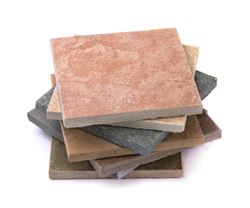New sensor to improve tile manufacture
The defect can occur as a result of poor mould design, inferior materials or bad technique, and is a major cause of losses during tile-making. Detection of density gradient faults before firing would lower manufacturing losses and allow for the recycling of good-quality materials. Funded by the EU, the NOVAPRESS(opens in new window) project aimed to develop a non-destructive density gradient sensor that could be incorporated into the tile press. A UK based Research and Technology Organisation led the NOVAPRESS consortium, which included both academic researchers and small businesses. Scientists first defined the common requirements and specifications of the sensor. At the same time, hardware was sourced or developed as necessary, and a first working prototype was produced. The team decided to first build a working laboratory sensor and then to apply it in a real-world environment. Other work focused on hardware and software for control, and for feedback from the sensors to the mechanical controls of the tile press. Testing and demonstration of the off-the-press prototype was extremely successful. Development of the final sensor is underway and it will be incorporated into several factories for commercial use. The NOVAPRESS technology is expected to add value to the ceramics market, and may be expanded to other manufacturing processes in the future.







